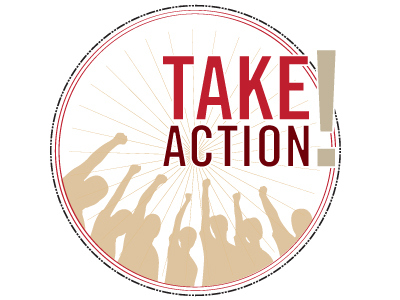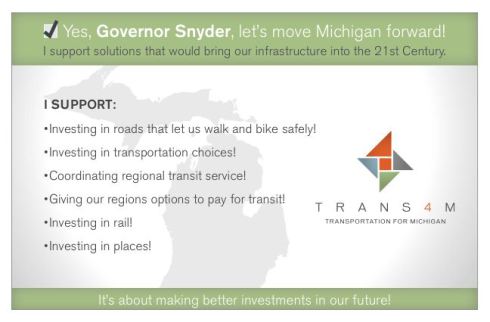You are currently browsing the monthly archive for October 2011.
 Killing Bicycle & Pedestrian Funding Won’t Fix Our Bridges
Killing Bicycle & Pedestrian Funding Won’t Fix Our Bridges
Contact Your Senators Today to Save Bicycle and Pedestrian Funding
Last month, we asked you to contact your U.S. Senators to oppose Oklahoma Senator Tom Coburn’s plan to strip funding from the Transportation Enhancements (TE) program, which is the main source of the federal investment for bike projects of all types. Bicycle advocates across the country generated more than 75,000 emails to Congress in 48 hours. This rapid and powerful grassroots response succeeded: Mr. Coburn withdrew his amendment and crucial funding for bicycling was preserved.
We are sorry to report today that walk/bike infrastructure funding is under serious and immediate attack again - this time in an amendment proposed by Senator Rand Paul (KY) that would redirect all funding for Transportation Enhancements to bridge repairs. Mr. Paul’s amendment is set for a vote on Tuesday, Nov. 1 when the Senate will finalize the transportation appropriations bill, setting funding levels for FY2012.
We need you to contact Senators Levin and Stabenow today and ask them to oppose this amendment. Here are four reasons why:
- Everyone deserves to be safe. We agree on the need to keep our bridges safe, but the lives of pedestrians and cyclists are important too. Thirteen people died when the Minneapolis bridge collapsed in 2007: since then, close to 20,000 pedestrians and 2,800 cyclists have died on our nation’s highways, largely as a result of poor highway design and a lack of safe non-motorized infrastructure – exactly what the enhancement program was created to fix.
- Reallocating walk/bike funding won’t make a dent in the cost of bridge repairs. If Sen. Paul’s amendment is successful, it would eliminate approximately $700 million in federal funding for FY2012 that is used to construct sidewalks, bike lanes, bike paths, trails and other infrastructure that makes it safe for bicyclists and pedestrians to get around. Even if every penny of these funds is diverted to bridge repairs, Senator Paul’s plan will still take 80 years to fix the backlog of bridge repairs we have today.
- Transportation Enhancements provide essential transportation benefits, like reducing road congestion, improving safety, getting people active, and creating more jobs per dollar than highway-only projects. Remember that the TE program represents less than two percent of the Federal transportation program and these projects help alleviate traffic congestion, improve safety, get people active, and create more jobs per dollar than highway-only projects.
- States don’t spend all the money they already receive for bridge repairs. Remember also that last year, states sent back to Washington $530 million of unspent bridge funds in rescissions – the states are leaving bridge repair funds on the table, unspent, year after year; they should at least spend these funds first.
If the Paul amendment succeeds, it will make it much more challenging to sustain funding for Transportation Enhancements, Safe Routes to School, and Recreational Trails in the long-term transportation bill that the Environment and Public Works Committee starts debating just 8 days later on November 9.
We must turn back any amendment to strip Transportation Enhancements.
Last month, more than 75,000 messages were sent to Senators to ask them to stand strong for Transportation Enhancements. That was an amazing turnout, but we must do better this time. Every time someone in Congress attacks bicycling and walking, we must push back even stronger than we did the time before. And, we will keep doing it until bicycle and pedestrian funding is protected.
This is the third time in a month that a small group of Senators have targeted Transportation Enhancements, using a different angle each time. It is a waste of the Senate’s time and taxpayers dollars to focus on this small and valuable program when we are in dire need of real and viable solutions to fix our failing transportation system.
Please contact your Senators today to ask them to vote against the Paul amendment (SA-821) to eliminate Transportation Enhancements. Then please forward this message to at least five others who care about the safety of people walking and bicycling on our streets.
Thank you for your help today, and for passing the call to action along.
 As you may know, Governor Snyder will be delivering his special address on Michigan infrastructure next week. LMB is pleased to be working with the Transportation for Michigan Coalition (Trans4m) is holding a week of action this week to help change the conversation to that of providing innovative transportation solutions to rebuild our cities and our economy.
As you may know, Governor Snyder will be delivering his special address on Michigan infrastructure next week. LMB is pleased to be working with the Transportation for Michigan Coalition (Trans4m) is holding a week of action this week to help change the conversation to that of providing innovative transportation solutions to rebuild our cities and our economy.
Tell Governor Snyder to move Michigan forward!
Week of Action: Help Transform Michigan’s Transportation Future
So far, most of the dialogue around Governor Snyder’s much awaited infrastructure plan has been about roads. While fixing our current transportation system is important, we need to acknowledge that strategic investment in rail, bus transit, and walking and biking through complete streets can help revitalize our cities and towns, reconnect people to jobs and opportunity, and reduce our transportation expenses.
Act now to tell Governor Snyder that you support solutions that will bring Michigan’s infrastructure into the 21st Century. There are easy ways you can tell the Governor that you want more than “business as usual” transportation planning and policy:
- Sign the online petition and pass it on via Facebook and Twitter
- Call Governor Snyder at (517) 373-3400
- Email Governor Snyder at [email protected]
- Visit the Transportation for Michigan Facebook Page
Ask Governor Snyder to consider the following solutions:
Invest in roads that let us walk and bike safely
Ensure the Michigan Department of Transportation adopts a statewide complete streets policy that is clear, comprehensive, and provides an effective framework for how state and local officials and citizens work together.
Invest in transportation choices
Allocate transportation funding strategically by investing in rail, public transit, and non-motorized options to build a 21st century multimodal transportation system.
Coordinate regional transit service
Establish a Regional Transit Authority that would coordinate and oversee regional public transit service in southeast Michigan. This would ensure greater efficiency and effectiveness for the region’s transit service.
Give regions options for pay for transit
Pass legislation that enables local communities and regions to choose from options to their fund their local transportation needs, with county or regional sales tax a top priority.
Invest in rail
Capitalize on the recent federal award by ensuring that our rail passenger rail infrastructure continues to expand and connect to cities and towns across the state.
These solutions will position Michigan for place-based economic development and result in vibrant places where people want to live and businesses want to locate.
 Last night was a big night for non-motorized transportation in Traverse City. The City Commission passed a Complete Street resolution without discussion as part of a consent agenda. Resident and local advocate Gary Howe commented on his blog that, “It may not be the bold resolution or ordinance that some of us would have written, but as long the actions to follow include the planning, consideration and implementation for all users–it’s all good.”
Last night was a big night for non-motorized transportation in Traverse City. The City Commission passed a Complete Street resolution without discussion as part of a consent agenda. Resident and local advocate Gary Howe commented on his blog that, “It may not be the bold resolution or ordinance that some of us would have written, but as long the actions to follow include the planning, consideration and implementation for all users–it’s all good.”
He went on to encourage continued participation in the regional Complete Streets Coalition that has been formed to discuss opportunities to implement Complete Streets within the Grand Vision in Northwest Michigan.
Shortly after the City Commission adopted the Complete Streets resolution, they also adopted an amendment to the City Code of Ordinances, Uniform Traffic Code Section 410.03, that requires all vehicles (including bicycles) to stop for pedestrians in marked crosswalks. State law currently only requires drivers to yield to pedestrians, not necessarily stop for them when they are attempting to enter the street from the curb. By passing this ordinance, Traverse City joins Ann Arbor in passing policy meant to help people safely cross a street. Ann Arbor has had their ordinance for about a year, but only recently began ticketing people for not following the new local law.
The Michigan Complete Streets Coalition congratulates the Traverse City Commission and local advocates for their ongoing efforts to improve safety for all roadway users.















